Gen A Conference: Making Change
VIEW EVENT DETAILSThis Year’s Class of Gen A Fellows Presents Its View on Asia and the World

Asia Society Switzerland is proud to announce the first Gen A Conference, conceptualized and executed by this year’s class of fellows.
With the Gen A Conference, we open the space for discussions and leave the stage to a new generation of Asia-savvy individuals. Looking at economic issues, finding sustainable solutions to current societal problems, and discussing opportunities of growth in Asia and beyond, three groups will voice their views and discuss together with experts the many forms of change that lie ahead and how we can get there – sooner, better, or smarter. Join us and learn about the questions that will shape our future!
Attendance is free. Please tell us as soon as possible if you are unable to attend the event. The Swiss Re Centre for Global Dialogue has decided to increase safety measurements against the ongoing pandemic to ensure the safety of all guests. Additionally to the requirement of a valid COVID certificate, masks have to be worn at all times, except when seated or consuming beverages and food. Additionally, the public aperitif has been canceled as well.
If you would rather participate online, please click here or reach out to us via [email protected] and we will send you a link to join us virtually.
The Gen A Conference is supported by our partner Swiss Re Institute.

Program
After a year of intense commitment, expert round tables and workshops, three groups will take the stage and will discuss the matters they care about most with experts and the public – and with a focus on Asia, of course. Addressing change in its many forms:
- 13:00 Welcome by Adrian T. Keller, Chairman of the Board of Asia Society Switzerland Foundation, and Christoph Nabholz, Chief Research Officer, Swiss Re Institute
- 13:30 How Asian Is the Asian Mega-Trade Agreement RCEP?
Change Means Embracing New Things – Not Just Bracing Oneself For Them - 14:30 Short Break
- 14:45 Eat the World – And Eat Up
Change Means Shaping How We See Food and Treat it – Lessons From China
- 15:45 Short Break
- 16:00 Beyond GDP: Sustainable Growth for Asia
Change Means to Keep Looking for Alternative (and Better) Ways Forward
- 17:00 Closing
Individual Sessions:
13:30-14:30 How Asian Is the Asian Mega-Trade Agreement RCEP?
Change Means Embracing New Things – Not Just Bracing Oneself For Them
Gen A Fellows: Adam Benacka, Yuhao Chen, Kevin Hubacher, Dennis Moser, Chirine Sunderland
Speakers: Patrick Ziltener, Michael Settelen, Patrick Dümmler, Rajiv Biswas
While many Asian-related issues make it into daily newspapers in Switzerland, reports on the Regional Comprehensive Economic Partnership (RCEP) seem to be scarce – especially when looking at its size and expected impact on the global economy: the 16 RCEP participating countries account for almost half of the world’s population [and] contribute about 30 percent of global GDP and over a quarter of world exports”1.
The trade agreement aims at facilitating “SME’s engagements in global and regional supply chains” and to “broaden and deepen ASEAN’s economic engagements with its [free trade agreement] partners”.2 Yet, the RCEP’s preamble suggests that its main goal is to “broaden and deepen economic integration in the region, strengthen economic cooperation and equitable economic development [among the Parties]” (RCEP, Preamble 2, p. 1). So, is this is an Asian arrangement only? Will Swiss SMEs be able to participate and benefit from the agreement? Or will Swiss companies be put at a disadvantage compared to local competitors on the RCEP member’s markets, as the Swiss State Secretariat for Economic Affairs (“SECO”) fears.3
14:45-15:45 Eat the World – And Eat Up
Change Means Shaping How We See Food and Treat it – Lessons From China.
Gen A Fellows: Nadine Lange, Jonas Niederberger, Seraina Petersen, Gabriela Siegenthaler, Julia Tscherrig, Philipp Wolf, Lawrence Wu
Speakers: Richard Brubaker, Luona Cai, Deborah Yi Wen Lee
The issue of food waste has justifiably been gaining attention around the globe in recent years. In China, it is estimated that enough food to feed about 30-50 million people goes to waste annually. The Chinese leadership and civil society are trying to fight the problem on various dimensions. In 2020 President Xi Jinping urged a "sense of crisis" and launched a Clean Plate campaign encouraging citizens to order less food and finish everything on their plate. In April this year, the "Chinese Food Waste Law" was adopted to prevent food waste by specifically banning competitive eating and binge-eating videos, as well as fining restaurants with excessive leftovers. Simultaneously, various non-governmental actors have started their projects to tackle food loss in China. In this panel, a closer look will be taken at the challenges and opportunities the Chinese State and NGOs face in their actions against food waste. What are the most promising approaches? And what are the biggest obstacles to reducing food Waste in China?
16:00-17:00 Beyond GDP: Sustainable Growth for Asia
Change Means to Keep Looking for Alternative (and Better) Ways Forward
Gen A Fellows: Timoteo Cozzio, Debjani Das, David Klug, Pablo Das, Samira Hüsler, Kellen McCullum, Andreas Ratchev, Isabelle Zheng
Speakers: Ashish Shah, Hang Tran, Urs Lustenberger, Heinzpeter Znoj
Asia has long become the world’s economic motor, with the rest of the world relying on many essential goods and resources from the area. However, despite Asia’s bright economic outlook, voices critical of the unrelenting growth have gained traction over the past years. In unison with sustainability initiatives all around the world, there’s a call for the world’s most populous continent to embrace alternative development paths – policies and ways of doing business that look to go beyond GDP and profits and pave the foundation for a more sustainable future for the environment, the local economy, and more importantly, the people. But is that a reasonable ask given widespread poverty in the region? Are there actually viable alternatives to classic growth models for Asia? Or is it all just empty rhetoric? A panel of experts from finance, business and development is discussing these questions.
Speakers
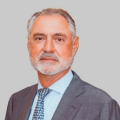
Adrian T. Keller is Chairman of the Asia Society Switzerland Foundation. Furthermore, he is the Honorary Chairman of DKSH and Vice Chairman of Diethelm Keller Holding Ltd, a family holding company, and anchor shareholder of DKSH, a listed MES company in Asia. Since 2000, he is Vice Chairman of Diethelm Keller Holding Ltd, and earlier a Board Member of the predecessor company. In addition to holding various family business-related Board seats, Adrian Keller is Vice Chairman of the private bank Bergos AG and is Chairman of Baur & Cie, a private real estate company. Among his pro bono involvements, he is a Trustee of Asia Society (Global) and a member of the Executive Board of the Swiss American Foundation.
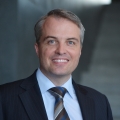
Christoph Nabholz is Chief Research Officer and Head of the Research & Engagement team at the Swiss Re Institute. His team manages Swiss Re's Strategic Council to deliver executive advice and foresight on risks across a broad and rapidly evolving business landscape. He started at Swiss Re in 2002 and held several research and business functions. Most recently he headed Life & Behaviour R&D at the Swiss Re Institute and before was Head Business Development at the Centre for Global Dialogue. He served Global Life & Health Underwriting in various technical roles. Prior to Swiss Re he was a postdoctoral research fellow in genomics at Harvard University.

Patrick Ziltener is Associate Professor at the University of Zurich and Lecturer and University Councillor at the University St. Gallen. He has analyzed multi- and bilateral Free Trade Agreements (FTA) for more than 15 years, in cooperation with Switzerland Global Enterprise, Chambers of Commerce and other trade-related organizations. From 2006 to 2009 he was State Secretariat for Economic Affairs (SECO) Senior Advisor for Economic Relations with East Asia and Secretary of the Free Trade and Economic Partnership Agreement (FTEPA) Switzerland-Japan negotiations.
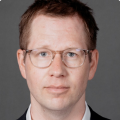
Michael Settelen is Director at the China Macro Group (CMG), focusing on China’s economy and economic policies at the nexus of policy and business. Prior to CMG, Michael worked as an economic editor for Asia at the Neue Zürcher Zeitung (NZZ), analyzing and commenting on economic, technology and political developments in the Chinese market. Michael holds a B.A. in Business Administration from ZHAW School of Management and Law and a dual degree-M.A. in Chinese-European Economics and Business Studies from the Berlin School of Economics and Law and the Southwestern University of Finance and Economics in Chengdu.

Patrick Dümmler is Senior Fellow and Head of Research Open Switzerland at Avenir Suisse. He is responsible for topics such as free trade, farming and energy. He holds a Master’s Degree in Economics of the University of Zurich, holds a Ph.D. from ETH Zurich and published several textbooks. After more than ten years as strategy advisor and as head of an association, which promotes medical technology exports, he joined Avenir Suisse in November 2015.
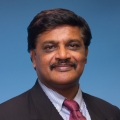
Rajiv Biswas is Executive Director and Asia-Pacific Chief Economist at IHS Markit. He previously was Director for South-East Asia for The Economist Group, Executive Director for Asia-Pacific Country Risk at UBS, and international economist for the Royal Bank of Scotland. Rajiv is a graduate of the London School of Economics, and received his M.Sc. and D.I.C. from Imperial College at London University. He frequently speaks at international conferences, including at World Economic Forum and United Nations conferences. The author of Future Asia, Asian Megatrends, and Emerging Markets Megatrends also regularly appears on international TV.

Richard Brubaker is the Managing Director of Collective Responsibility, Founder of HandsOn China and an Adjunct Professor of Sustainability and Social Innovation at Southern Methodist University. Driven by the belief that change begins with a single step, Brubaker has spent the last 20 years in Asia working to engage, inspire and equip those around him to take their first step. Acting as a catalyst to driving sustainability, to bring about the changes in leadership and business models, and to recalibrate old models so that new opportunities can be captured, Brubaker’s work is centered around building foundations of knowledge, understanding core issues, engaging stakeholders, and doing what it takes to move forward. To date, Brubaker has overseen the development and execution of more than 200 projects focused on solving the social, environmental and economic challenges that are faced in Asia. Richard holds a Masters in International Management from the Thunderbird School of Global Management, and serves as the Chairman of the Sustainability and Corporate Social Responsibility Committee of the American Chamber of Commerce in Shanghai.

Luona Cai co-founded The Circular π to launch a transnational community focused on circular economies and sustainability, sparked by her experiences running projects and events at the Global Shapers Community Shanghai Hub. She also co-initiated Dou Zhe Zou, a platform to solve surplus food issues and provide anti-food-waste solutions in China. She has served as a regional lead of the Climate and Environment Action Steering Committee at Global Shapers.

Deborah Yi Wen Lee is a Plant Forward Whole Foods Chef Educator, a noted member of ‘THE CHEFS’ MANIFESTO’ initiative by SDG2 Advocacy Hub and also a key initiator for many global food education programs. She is a world citizen with 17 years of fashion marketing experience in New York and China who started a transition to the world of whole foods education since 2012. She is also a co-founder of The Plant Forward LLAB with the mission to educate, collaborate and initiate real actions and positive changes using food as a social lubricant for a sustainable human health and planetary well-being system #lets.plantforward.together.
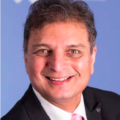
Ashish Shah is Director of the Division of Country Programmes at the International Trade Centre (ITC). Prior to joining ITC, he worked first at the International Labour Office in Geneva and then at the United Nations Conference on Trade and Development (UNCTAD). Mr. Shah has more than 20 years of international and United Nations experience in the field of trade promotion and development, during which time he has been providing strategic advice on trade-development issues and engaging in high-level policy dialogue with stakeholders in Africa, Asia and the Arab Region.
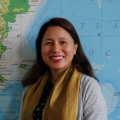
Hang Tran is Senior Coordinator at the Executive Secretariat for the Enhanced Integrated Framework (EIF) at the World Trade Organization (WTO), where she is responsible for coordinating and providing customized trade-related technical support to EIF Countries in Asia and in some West African Francophone countries. Before joining the EIF, Ms Tran served as Deputy Permanent Representative at the Vietnam Mission to the WTO and as Director-General of the Ministry of Trade and Industry of Vietnam. She was also a visiting lecturer at the National University of Vietnam, member of the Vietnam National Committee for the Advancement of Women, as well as Director of the Multilateral Trade Policy Assistance Programme.

Urs Lustenberger is the President of the Swiss Korean Chamber of Commerce and the Swiss Asia Chamber of Commerce. He is a legal expert in the fields of international commercial arbitration and litigation, competition law, real estate law and healthcare. He holds a doctoral degree from the University of Zurich and is a member of the American Bar Association as well as the Inter-Pacific Bar Association. Dr. Lustenberger is consistently consulted by governmental, legal and economic entities regarding the rapidly developing region of the Asia-Pacific.
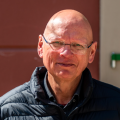
Heinzpeter Znoj is a professor at the University of Bern in the field of social anthropology. He is the director of the board of the Center for Development and Environment at the University of Bern. Professor Znoj holds a PHD from the University of Bern, in which he researched the social consequences of modern market integration in Indonesia. He has further conducted research as a post-doc fellow at both Yale and Cornell University. His accumulated expertise in economically precipitated social issues in Southeast Asia has led him to head a great range of research and developmental projects in the region. He is thus highly knowledgable on the challenges of market integration in developing Southeast-Asian countries. Most recently, he worked as principal investigator of the r4d-research project "Feminisation, agricultural transition and rural employment: Social and political condiFons of asset-building in the context of export-led agriculture and alternative income generating opportunities”.
Moderation

Cecilia Perversi is a Marketing Manager and Co-Chair & Co-Founder of Young Professionals Network at UBS in Zurich. She’s from Italy, where she grew up and studied at Bocconi University to then move to Zurich to get her Master’s at HSG and build her professional career in marketing, exploring various industries. She loves to grow and learn new things, which is why she is a Gen A alumna herself and mentors HSG students in her free time (including one of the current Gen A fellows!).

Gabriel Ruggli is Co-CEO of C-Level, an Exchange Platform for Swiss Executives. Furthermore, he founded one of the largest Swiss Drive-In Cinemas Autokino Winti during the Covid Crisis. As a teenager his first start-up led him to China and sparked his love for the continent. Studying between Beijing, Shanghai and Zurich he graduated his Master at HSG specializing in PRC’s commercial law and is a Gen A alumnus of 2020.